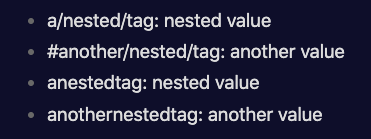Hi,
I found some use cases for assigning strings to tags, for example for building a health diary with dataview from my daily notes.
While writing my daily notes I would e.g. write #on/health/spine:: went to doctor today, he told me xyz.
Using $= dv.span( dv.current() ) in that daily note, showed me, that the note has the tag #on/health/spine and the dataview-fields
-
on/health/spineand -
onhealthspine(I learned, that this is the normalised dataview field version of the the fieldon/health/spine
Creating
```dataview
Table onhealthspine
From #on/health/spine
```
shows me all my entries in my daily note about spine problems/comments.
Here are two problems with that approach:
- the slashes in the nested tags don’t work in the dataview-query, so I have to use the normalised dataview-field in the DQL
- updating my tags with the tag wrangler plugin, doesn’t update the a) tags in dataview-queries in general and b) especially not the normalised dataview-fields…
So my request is:
- Would it be possible to use nested tags in dataview-queries?
- Would it be possible to combine the tag-wrangler plugin with dataview, so that updates in the tag-names, automatically updates the dataview-queries?
